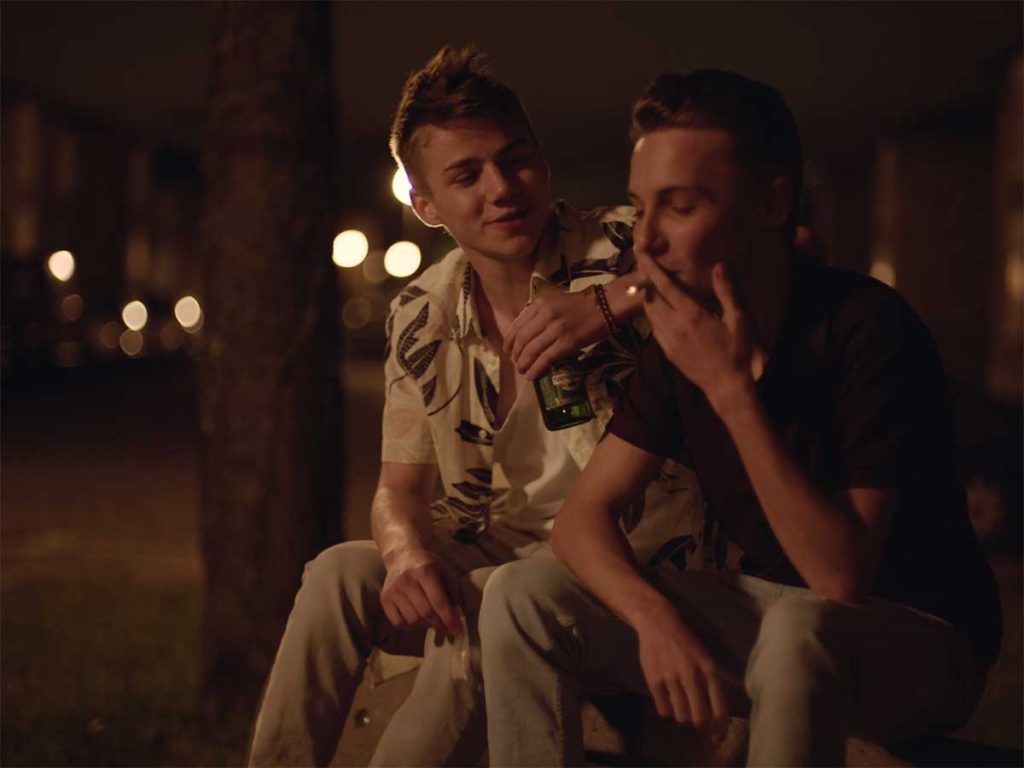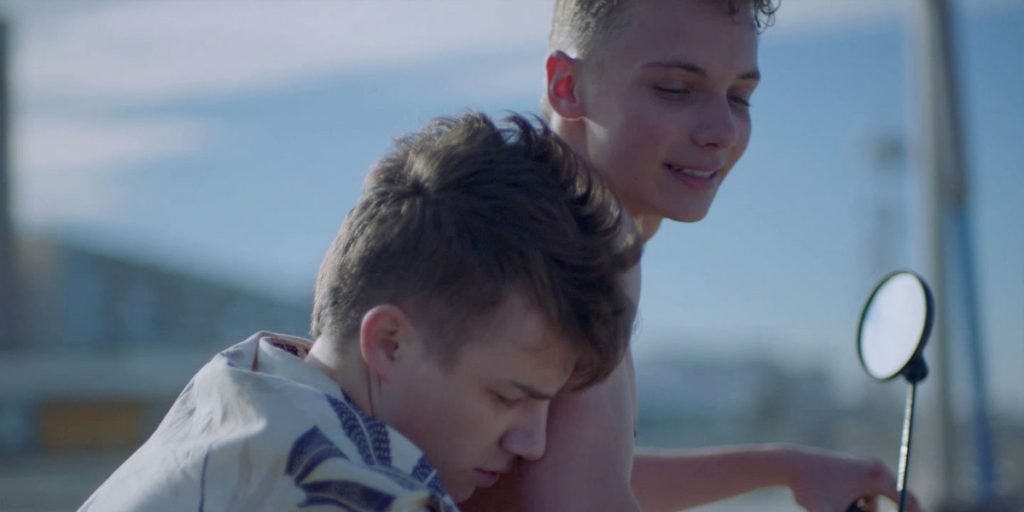Guillaume Grélardon’s A Night in the Fields, an endearing ode to the absurdity of life as an adolescent boy, takes us on a fond, humorous but intense adventure.
Adolescence is a confusing experience. Apart from the bodily changes caused by hormones and the perception of people as sexual beings, the idea of one’s social image begins to get clearer around that time as well. Everyone is more conscious of how they’re perceived, and societal expectations play a major role in the way this consciousness manifests. Society in this context is just as much the media and social media as it is the actual people in the immediate surroundings – that is, peers, parents, and other adults. And depending on circumstances and exposure, two boys can perceive masculinity in completely contradictory ways despite the concept being essentially the same. This idea is sort of what A Night in the Fields is about.
Directed by Guillaume Grélardon (also the film’s writer) and set in a working class town near the French border, the film follows two fourteen-year-old boys, Anthony (Jérémy Gillet) and Dylan (Félix Lefebvre, of Summer of 85), adventurous best friends who one day decide to crash a nightclub party. Focusing primarily on the events of the evening and the life-changing consequences they have on them, A Night in the Fields essentially depicts two widely varying but equally grey manifestations of masculinity in adolescents. The first is conveyed through the character of Dylan, who embodies a more traditional kind of masculinity.
Dylan is kind of brash when he speaks about women, often using sexual language, and he’s also fascinated by physical displays of manliness, like fistfights. He has a habit of teasing Anthony for his appearance and shy behaviour, and a tendency to get into fights with his elder brother. Anthony, on the other hand, embodies some traits that could be perceived as more traditionally feminine: he’s much more reserved with his words and actions, preferring to calmly observe and not even respond to teasing with comments of his own. He isn’t easily triggered and he has an innate maternal instinct to protect and care for anyone in need.
But there’s a lot more to these characters. Dylan might be violent and brash, but he also has a youthful energy that is a great motivational presence, and he wears his heart on his sleeve. Anthony is more seemingly secure about his masculinity, but his apparent control gets lost in moments of extreme outbursts, when he gives into a certain rage that seems to be boiling underneath, triggered by his protective and chivalrous nature. At the end of the day, both characters conform to the patriarchal society’s concept of what it is to be a man, because they both believe they should be the ones in a control of a situation, whether by force or by attitude.
And even if the way they treat women widely varies, both of them perceive women objectively. For Dylan, it’s about being dominant when in presence of a woman, establishing his superiority and ensuring his presence feels gratifying to her, and for Anthony, it’s about being sensitive and playing the part of the rescuer, as if his presence were a gift. But there’s also a contradiction in their identities, and that has to do with their upbringing. And to establish that context, we are introduced to their domestic situation, before their journey for the evening commences.

We find out that Anthony’s mother is bedridden, and, as the oldest man in his home, he has to take care of everyday tasks like cooking dinner and looking after her. He’s not just in charge, but he has to be conscious and responsible for his mother’s sake, which is why his behaviour is usually more controlled than Dylan’s. But he also has a protective nature which is fierce, and this is where his violent outbursts come from, as they usually happen when he’s trying to protect women.
Dylan, on the other hand, lives with an elder male who is able to physically overpower him, and this leads to him having insecurities about whether or not he’s manly enough. This is why he’s so into fistfights and teases Anthony so much: Dylan doesn’t need to be quiet about his feelings. He’s also fascinated by Anthony’s displays of violence because shows of physical strength mean a lot to him, and so does the more traditional patriarchal gender role of being the one in control when in presence of a woman.
These two contradictory expressions of masculinity are beautifully paced out in A Night in the Fields. The film isn’t just a critique of toxic masculinity, and it doesn’t take any stances with respect to the characters. Instead of preaching about good or bad, the film simply paints an honest portrait of male adolescence. We shouldn’t be quick to judge Dylan as abrasive and Anthony as sensitive because personality is complex and everyone has their own redeeming traits. And eventually, despite the increased sensitivity today, patriarchy as a social construct is so deep-seated that no one’s really free from its grasp, no matter their upbringing, even if its impact varies widely, and seems to be superficially less in some people. Apparent femininity also has its own way of acting according to archaic and traditional genre roles, so neither of the friends is good or bad, and just like the film itself, we should also not take sides given how grey and complicated the situation is.
This topic is a serious one and the film has its moments of intensity, but overall, A Night in the Fields is quite humorous. That is a very organic choice though, given the way a teenager essentially looks at the world with a youthful sense of humour, finding quirkiness in just about everything and turning innocent occurrences into lewd jokes. There’s a delicate balance between the moments of comedy and the moments when the toxicity in the main characters is on display. This perfectly reflects the instability in the mind of these youngsters who are prone to mood swings. So the film isn’t just a clinical depiction of two French teenagers processing adolescence over a tumultuous evening, it’s a fond portrait of adolescent behaviour, as if presented through the perspective of adolescents themselves. Since the film adopts their point of view while critiquing societal perception of manliness, even in the moments that it meanders with just macho dialogue and the two friends goofing about on the road, it remains equally interesting and captivating as in the scenes with a lot of action.
Along with the camera closely following the antics of the friends, there are quite a few visual metaphors. The most prominent one is in an intense scene, where Anthony and Dylan are each in separate rooms. The former is in a room with pink lighting while the latter is in one with blue lighting. It’s an obvious nod to their inner nature if one is to interpret this along the lines of conventional gendered symbolism of the two colours. Towards the end of A Night in the Fields, there’s a moment where they ride a bicycle, Anthony driving it, with Dylan sitting behind him. It’s a consequence of the story, but I think there’s more to the fact that Anthony’s shirtless in the scene. Many iconic couple bicycle rides in cinema depict the man in the driver’s seat with the woman behind, and this is like a reversal in the roles within their dynamic. This reversal both establishes a neutral balance between them, and can be interpreted as depicting that the impulsive nature of Dylan makes him the child and the protective nature of Anthony makes him the mother in their friendship.
Jérémy Gillet as Anthony delivers an extremely nuanced performance, primarily composed, but layered enough for the outbursts to feel absolutely authentic. He carries himself with a confidence that can further convince a viewer that Anthony is indeed secure in his manliness, but there are some subtle shifts in his body language around women, specifically a college student Océane (Nadia Tereszkiewicz), who he meets early on in the film, which conveys Anthony’s chivalry which manifests more in the form of not taking lead and being generally shy in front of women.
Félix Lefebvre, on the other hand, is the opposite when around his fellow female cast-members, portraying Dylan as a boy who tends to overcompensate due to his insecurity with an almost objectifying gaze in his body language. Félix’s performance is infectiously energetic, and this contrasts with Jérémy’s performance to create a tangibly electric chemistry between the two main characters. If I’m being honest, their chemistry in the first scene had convinced me this was a story about homosexuality. To find out whether it’s the male gender version of Céline Sciamma’s Water Lilies though, you’ll have to wait to watch the film.
Apart from visual metaphors, A Night in the Fields is beautifully shot, with mesmerizing frames of scenery. The use of what seems to be a handheld camera makes the audience feel like passive participants in the story. This makes the action easier to follow as well but makes the psychologically intense scenes that much harder to reconcile as a viewer. With close-ups, the lens plays a crucial part in creating an unapologetically honest narrative that may not be for the squeamish, especially in the climactic ten minutes before the last scene. The score sounds like a soulful ode to youth. The melodious composition sounds nostalgic about being a teenager but also has playful notes that reflect on the adventurous nature in anyone of that age.
What I absolutely love about A Night in the Fields, apart from the nuanced handling of such a timelessly relevant but complicated topic, is its self-awareness. The theme it tackles has essentially got juvenile undertones, especially because this is adolescence-focused, and the tone of the film is consistent with this throughout. The mood isn’t grievous and even triggers a little nostalgia for anyone who’s lived through that age. Their friendship is beautiful, and they have each other’s backs through all the difficult proceedings of the evening. They love each other and take care of each other and there’s a nourishing atmosphere within their bond that’s completely oblivious of the societal conditioning in them. And this is a heartwarming take on the development of toxic masculinity because this is what confirms it’s purely conditioned into them because as people, they’re not just their masculinity.
So while A Night in the Fields can be read as a thesis-of-sorts on the manifestation of masculinity, it’s a lot more than that. The last scene of the two friends skinny dipping in the sea, as opposed to the opening scene in which they were swimming in the pool, is a great allegory to how their perception of the world has opened up because of the evening. And you get a feeling that while you’re going to leave them now with the credits rolling, they’ll be fine despite the quite traumatizing last few moments of the night.
A Night in the Fields will be released globally on Digital Platforms on February 21, 2022.

